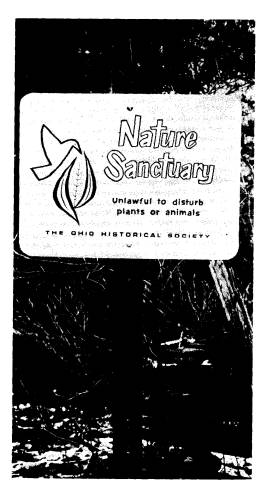Ohio History Journal
|
|
|
THE SOCIETY'S STATE MEMORIALS WAHKEENA: NATURAL HISTORY PRESERVE by DAVID H. STANSBERY |
|
OVER 200,000,000 years ago coarse sand and gravel from a slowly eroding moun- tain range were washed into a shallow sea that covered what is now south-central Ohio. During the millions of years that followed, the huge beds of sand that formed along the edge of this ocean were first compressed into solid rock, then were slowly lifted above the sea level. This rock formation, the Blackhand Sandstone, forms the bedrock foundation beneath the Wah- keena nature preserve in Fairfield County. Exposed to the erosive forces of wind and water, this sandstone was gradually carved into hills and valleys. While this sculpturing was going on, plants and ani- mals from adjacent land areas moved into the newly exposed area. Aquatic species made their way into the streams that drained the new-made land. Only those plants and animals that could get to the area entered it, and of those, only the few able to live in this new environment es- tablished populations there. In the eons following, some of the early species died out as the environment slowly changed. Others were able to move into the region as conditions became suitable for their survival. Some of the descen- dants of the early organisms changed in such a way that succeeding generations were able to survive under the new con- ditions, but as somewhat different forms. This process of change still continues in both environment and organisms. Man, a very recent invader, is having an ever-in- creasing effect upon the nature and direc- tion of the change. During the last million years (only yesterday, geologically speaking) Ohio and its neighboring states were invaded by at least three continental glaciers. These enormous ice sheets pushed as far south as Cincinnati in western Ohio, but the high hills of eastern Ohio held back the ice. A few glacial lobes projected into the lower valleys along the edge of the hill country, and one such icy "finger" apparently ex- tended down the Hocking River valley to |
